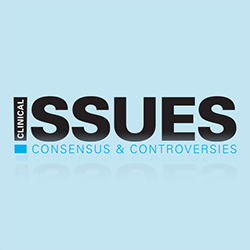Biologic therapies for severe asthma.
Brusselle GG, Koppelman GH. N Engl J Med. 2022;386(2):157-171.
Identification and treatment of T2-low asthma in the era of biologics.
Kyriakopoulos C, et al. ERJ Open Res. 2021;7(2):00309-2020.
Controversies in allergy: choosing a biologic for patients with severe asthma.
Pavord ID, et al. J Allergy Clin Immunol Pract. 2022;10(2):410-419.
A rationale approach to compare and select biologic therapeutics in asthma.
Wang E, Wechsler ME. Ann Allergy Asthma Immunol. 2022. [Epub before print].
How to assess effectivness of biologics for asthma and what steps to take when there is not benefit.
Pepper AN, et al. J Allergy Clin Immunol Pract. 2021;9(3):1081-1088.
Tezepelumab in adults and adolescents with severe, uncontrolled asthma.
Menzies-Gow A, et al. N Engl J Med. 2021;384(19):1800-1809.
Effect of tezepelumab on airway inflammatory cells, remodelling, and hyperresponsiveness in patients with moderate-to-severe uncontrolled asthma (CASCADE): a double-blind, randomised, placebo-controlled, phase 2 trial.
Diver S, et al. Lancet Respir Med. 2021; 9(11):1299-13312.
Efficacy and safety of itepekimab in patients with moderate-to-severe asthma.
Wechsler ME, et al. N Engl J Med. 2021;385(18):1656-1668.
Randomized, double-blind, placebo-controlled study of brodalumab, a human anti-IL-17 receptor monoclonal antibody, in moderate to severe asthma.
Busse WW, et al. Am J Respir Crit Care Med. 2013;188(11):1294-1302.
Mastinib significantly decreases the rate of asthma exacerbations in patients with severe asthma uncontrolled by oral corticosteroids: a phase 3 multicenter study.
Chanez P, et al. Am J Respir Crit Care Med. 2020;201:A4210.
KIT inhibition by imatinib in patients with severe refratory asthma.
Cahill KN, et al. N Engl J Med. 2017;375(20):1911-1920.
Patient Advoacy Organizations
Asthma and Allergy Foundatin of America (AAFA)
AAFA is dedicated to improving the quality of life for people with asthma and allergic diseases through education, advocacy, and research.
American College of Allergy, Asthma & Immunology (ACAAI)
The ACAAI fosters a culture of collaboration and congeniality in which members work toward the common goals of patient care, education, advocacy, and research.
American Lung Assocation
The ACAAI fosters a culture of collaboration and congeniality in which members work toward the common goals of patient care, education, advocacy, and research. The American Lung Assocation is the leading organization working to save lives by improving lung health and preventing lung disease through education, advocacy, and research.
American Thoracic Society (ATS)
The mission of the ATS is to improve health worldwide by advancing research, clinical care, and public health in respiratory disease, critical illness, and sleep disorders.
Chest Foundation
The CHEST Foundation creates trusted patient education resources and disease awareness campaigns that empower patients to engage in better managing their health.
Clinical Practice Guidelines
Global Strategy for Asthma Management and Prevention.
Global Initiative for Asthma, 2022.
Clinical Practice Tools
Centers for Disease Control and Prevention (CDC) Asthma Action Plans
These tools for asthma control were created following the evidence-based guidance published by the National Institutes of Health.
Asthma Control Test (ACT)
This 5-question test evaluates asthma control over the past 4 weeks on a 5-point Likert scale. A score of <20 on the ACT suggests asthma that is uncontrolled.
Nathan RA, et al. J Allergy Clin Immunol. 2004;113(1):59-65.
Asthma Control Questionnaire (ACQ)
This 7-question assessment tool measures asthma control over the past 7 days. Six questions are self-administered by the patient, and 1 question requires a clinician’s input. Scores range from 1 (totally controlled) to 6 (severely uncontrolled).
Juniper EF, et al. Eur Respir J. 1999;14(4):902-907.
Asthma Therapy Assessment Questionnaire (ATAQ)
This 4-question test assesses asthma control over the past 4 weeks. Each question has a possible score of 0 or 1; if the sum of the 4 question scores is >1, the patient’s asthma may be uncontrolled.
Vollmer WM, et al. Am J Respir Crit Care Med. 1999;160(5 Pt 1):1647-1652
Shared Decision-Making Tool
The CHEST Foundation, Allergy and Asthma Network, and American College of Allergy, Asthma & Immunology (ACAAI) have developed a shared decision-making tool for adults with severe asthma so that they may work collaboratively with clinicians to improve self-management skills, choose the best treatment plan, and increase adherence.


Lifting the Bar in Severe Asthma
Translating Pathophysiologic Insights Into New Targeted Therapies
| Faculty: | Michael E. Wechsler, MD, MMSc |
| Release: | 06/29/2022 |
| Expiration: | 06/29/2023 |


Clinical Issues in Severe Asthma
Debates and Discussions About New Upstream Treatment Avenues
| Faculty: | Monica Kraft, MD; Reynold A. Panettieri, Jr, MD |
| Release: | 08/26/2022 |
| Expiration: | 08/26/2023 |






